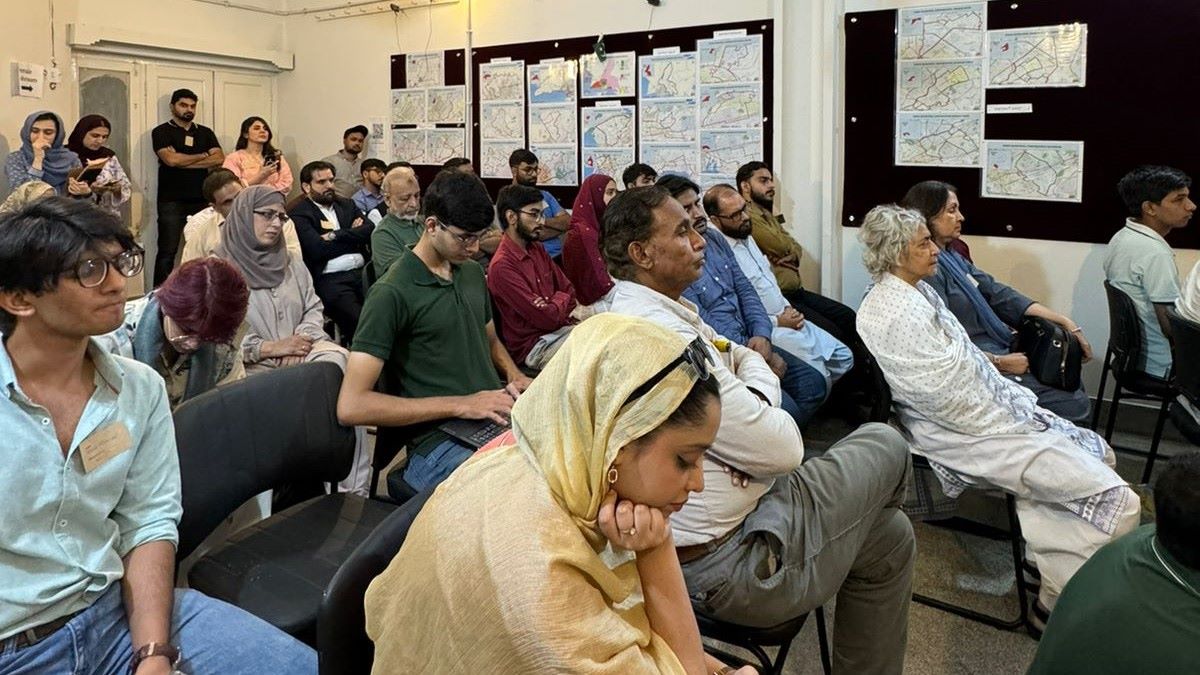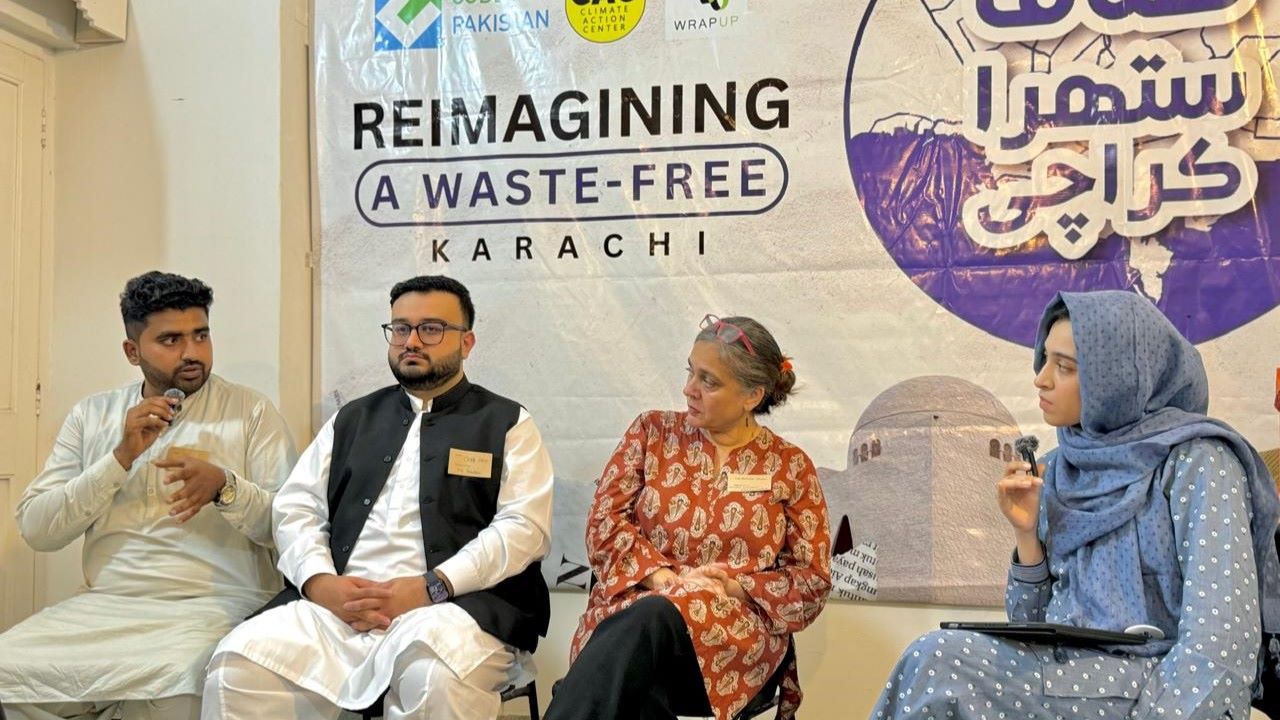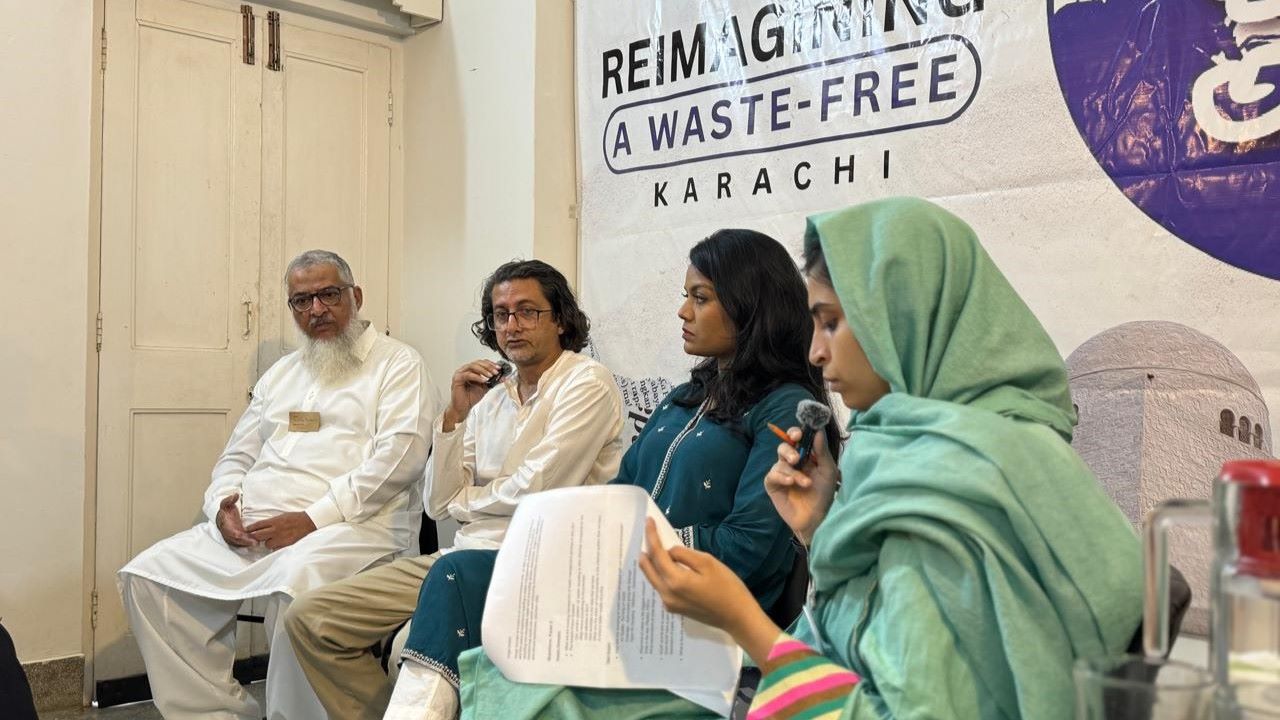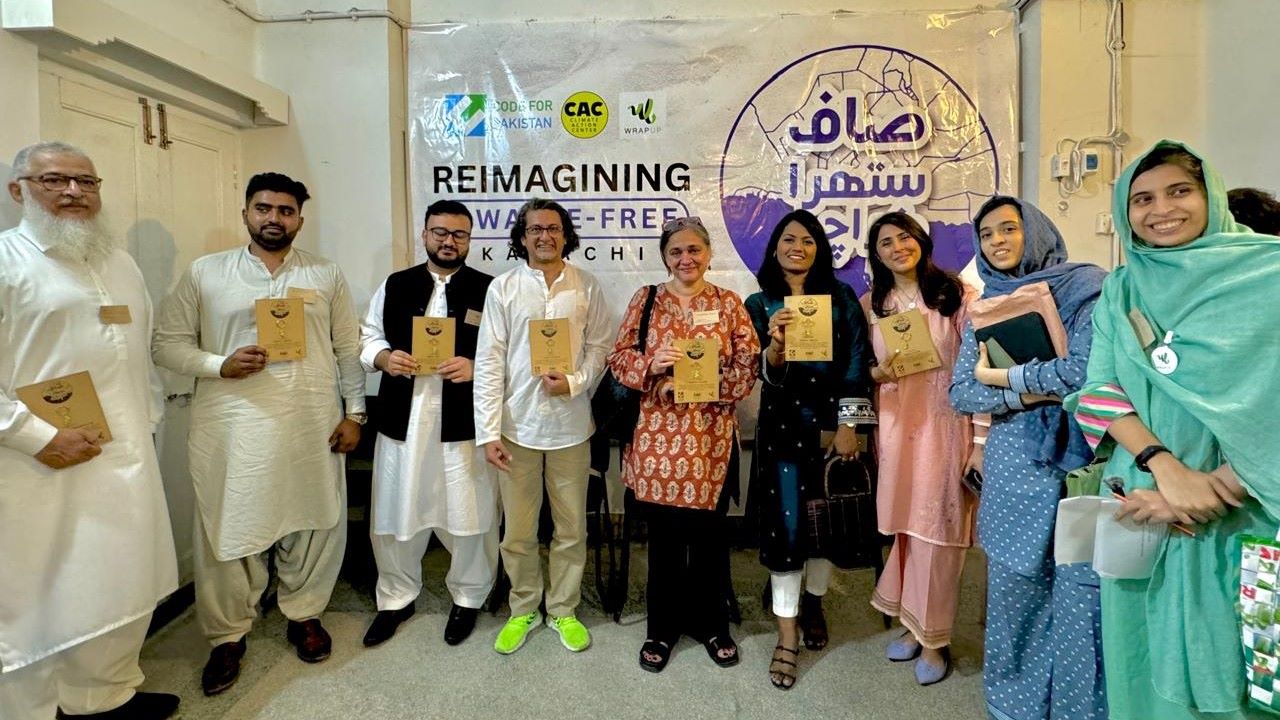
The Saaf Suthra Karachi campaign is a partnership between Code for Pakistan, Climate Action Center Karachi, and Wrap Up. Together, we are addressing Karachi’s waste management crisis by engaging in meaningful dialogue and encouraging community-driven solutions. This campaign aims to tackle the growing waste issues, the impacts of climate change, and steps to move towards more sustainable practices as a community.
Reimagining a Waste-Free Karachi
On September 21st, 2024, we initiated an impactful conversation by bringing together policymakers, non-profit organizations, volunteers, and academics at the Climate Action Center to re-imagine a waste-free Karachi. Our mission is to spotlight the critical effects of climate change on Karachi in light of global climate concerns and create sustainable solutions for its waste management challenges.
Together, we aim to create a cleaner, greener Karachi! If you’re passionate about tackling waste management, join us in taking meaningful steps toward a sustainable future. Let’s work together to make Karachi Saaf Suthra—because the change starts with us.
Karachi's Waste Management Crisis: The Numbers
Karachi is home to over 20.3 million people (2023 census), making it the largest city in Pakistan. However, this rapid growth has come with challenges—Karachi generates 12,000 to 16,000 tons of waste daily, and 40% of this is not picked up. Most of this waste ends up in drainage systems, contributing to severe flooding during monsoons.
Plastic pollution is another significant issue, with 65% of the waste along Karachi’s coastline being plastic. This pollution threatens not only the marine ecosystem but also the city’s mangrove forests, which act as vital carbon sinks, protecting Karachi from the effects of climate change.
Event Highlights
Our event featured two key panels:
- Panel 1: Community Perspectives: Residents of Machar Colony shared first-hand experiences of their daily struggles with waste management. These areas are heavily impacted by overflowing drainage systems and improper waste disposal, especially during monsoon seasons.
- Panel 2: Expert Insights: Environmental and waste management experts discussed innovative strategies to improve Karachi’s waste system, including the importance of waste segregation, plastic recycling, and community-based solutions.
Community Perspectives on Waste Management

The panel explored the waste management challenges in Machar Colony, an area severely impacted by solid waste clogging major drainage systems (naalas). It’s proximity to the sea, which forms part of Karachi’s natural drainage system, exacerbates these issues.
- Abdul Qadir, a youth activist from Machar Colony, shared insights on how his community navigates waste management through both formal and informal systems, highlighting the significant challenges they face.
- Tahera Hasan, a human rights lawyer and founder of Imkaan Welfare Trust, discussed the disproportionate impact of waste on women and children in Machar Colony. She addressed specific health problems faced by the community due to the lack of awareness. Food waste and plastic food packaging were identified as the most problematic trash, with some residents even burning waste inside their homes due to insufficient awareness.
- Omer Arif, an environmental engineer from EMC Pakistan, provided expert insights into Karachi’s waste management systems and plastic mapping projects. He emphasised that existing landfills are inadequate for the amount of waste generated in Karachi. Construction of the Jam Chakro landfill has begun, but this only addresses municipal waste, not industrial. He also highlighted that waste-to-energy solutions are not viable in the current context and stressed the importance of raising awareness among children.
Expert Insights on Waste Management Solutions

The second panel focused on strategies to improve waste management in Karachi, from recycling to plastic waste upcycling.
- Hussain Tawawalla: An environmentalist with over 40 years of experience, shared insights on Karachi's informal recycling system. He emphasized the importance of gathering and centralizing data through an open data platform to better understand and address waste management challenges.
- Yasir Husain: Director of the Climate Action Center Karachi, discussed the impact of waste dumping on air quality and drainage systems. He provided recommendations for K-CAP and the creation of innovation labs to address these issues.
- Angel Imdad: Founder of Irvede, spoke about upcycling non-recyclable waste and the challenges faced by private entities in waste collection. She highlighted that food waste is prevalent, and mixed waste (wet and dry) increases costs and complexity. A key health hazard is the frequent use of Styrofoam to package food, releasing toxins into what we consume.
From Conversations to Action: Key Takeaways
- Collective Action is Essential: Addressing Karachi’s waste crisis requires community-driven efforts. Waste management is a shared responsibility, and only through collective action can we create sustainable solutions.
- Waste Segregation at the Source: One of the most impactful solutions is waste segregation at the household level, which can significantly improve recycling rates and ease the burden on the city’s waste systems.
- Community-Based Initiatives: Grassroots actions like composting and local recycling programs were emphasized as crucial tools in combating the waste crisis. Empowering communities to act is key to long-term success.
- Data Collaboration for Greater Impact: Code for Pakistan can spearhead the creation of an open-source dataset, streamlining information across organizations to foster better collaboration and maximize the effectiveness of waste management strategies
Next Steps and Recommendations
- Jam Chakro Landfill: There is a need for access to the new plan for the landfill to understand its long-term impact and implementation.
- Environmental Impact Assessment: An analysis is required to evaluate the environmental consequences of the landfill project, examining both positive and negative aspects.
- Methane Emissions: Burning methane without proper collection systems poses a greater environmental hazard than carbon dioxide emissions, highlighting the need for better management.
- Incorporating Biotech Solutions: The project could benefit from biotech expertise, starting with evaluating current processes to potentially create useful byproducts. There is potential to develop devices that convert waste into fuel or other valuable resources.
Collaborative Partners

- Code for Pakistan: Code for Pakistan launched FloodLight, Pakistan’s first open-sourced disaster management platform, in response to the 2022 floods. With the help of community and on-the-ground volunteers, this platform provided valuable data to help manage disaster relief efforts.
- Climate Action Center Karachi: Mandated by the mayor’s office, the Climate Action Center is working on the Karachi Climate Action Plan for 2025. Through initiatives like Saaf Suthra Karachi, the center is fostering public dialogue and creating actionable solutions to address climate challenges.
- Wrap Up: A social enterprise committed to upcycling waste and driving behavioral change. Wrap Up’s goal is to turn plastic waste into artisanal products while creating awareness around recycling and upcycling.
Join us in creating a Saaf Suthra Karachi, where community-driven solutions lead the way toward a cleaner, greener future.